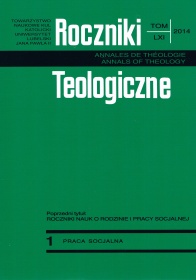Institutions and Forms of Support for Soldiers Returning from the Mission
Abstract
Nowadays, the role of the Polish Armed Forces took on an entirely different meaning. The crucial moment of great change was the terrorist attack on the World Trade Center September 11, 2001, after this terrible incident, the world faced a major threat of terrorism. Most countries have realized that the freedom of citizens must begin to fight, the fight against terrorism began in the cradle of the largest – in Afghanistan. The main tool in the fight against terrorism is military. A high level of training of soldiers, a special selection of the best candidates for emerging professionals ensures that the soldiers involved in the fight against terrorism cope with this task. And indeed it is the Polish soldiers involved in the Afghanistan mission in the eyes of its international allies are perceived and evaluated very highly. But so much sacrifice has its price, soldiers returning from missions often face mental health problems that affect their continued existence in the family, the local community and society. You created special programs for soldiers curtain to address the mission of helping the participants and their families. In the present article discusses the forms of support and assistance to soldiers and their families and loved ones.
References
Czerniewska H., Tynkiewicz K. (red.), Instytucje Pomocy Społecznej, Warszawa 2008.
Łuniewska M., Goluch R. (red.), Człowiek ponad wszystko, Wrocław: Ministerstwo Obrony Narodowej 2005.
Pamięci Poległych w misjach poza graniami kraju, www.isaf.pamiecipoleglych. mon.gov.pl (dostęp: 25.10.2013).
Program Ministerstwa Obrony Narodowej. Program osłony psychologicznej uczestników misji poza granicami państwa i ich rodzin (mps).
Stowarzyszenie „Rodzina Wojskowa”, http://www.rodzinawojskowa.mw.mil.pl (dostęp: 25.10.2013).
Udział żołnierzy Wojska Polskiego w operacjach poza granicami państwa, http:// www.medycynatropikalna.pl/images/userfiles/file/artykuly/Udzial%20zolnierzy%20WP%20-%20artykul.pdf (dostęp: 25.10.2013).
Copyright (c) 2014 Roczniki Teologiczne

This work is licensed under a Creative Commons Attribution-NonCommercial-NoDerivatives 4.0 International License.





